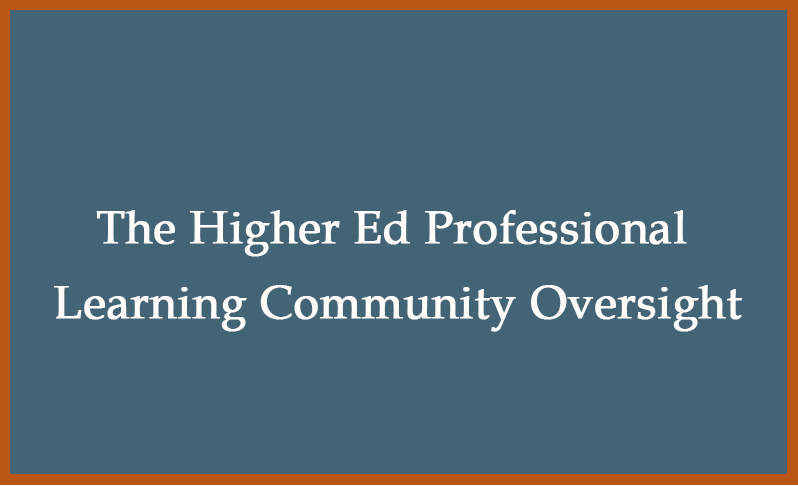Over the past ten years we have averaged sponsoring two professional learning communities (PLCs) per semester. It wasn’t until we organized the Faculty Innovators, however, that we began to consider the concept of oversight. After we select, and sometimes train a facilitator, we have traditionally not observed him/her. Why? We could say that we haven’t thought about it, but the truth is that most of the PLCs have taken place in the faculty lounge outside our office, so we have been very privy to what’s going on.
Related Reading: The Great Professional Learning Community Experiment
Oversight a Challenge for Developing Faculty Innovators
This semester, though, the PLCs are being run across the campus, and we have lost contact. Also, as we have tried to organize our recently launched Faculty Innovators (FI) program, we have become very much aware of accountability, of keeping records, and of assessment. So, just as we launched the FI program before we had it completely figured out, we have decided to develop some sort of oversight of the PLCs on the fly.
Related Reading: An Inside Look at a Faculty Innovator Progress, Part I
As a model for keeping track of PLCs, we used the faculty consultation process (our faculty mentoring program), especially the classroom observation portion. As for a procedure, we opted for asking PLC facilitators to invite us to join the group whenever we could, not as an outside observer but as a potential participant. When we perform classroom observations, we give the instructor being observed the choice of mentioning the class has a guest today, explaining why, or just ignoring the two-hundred-pound gorilla in the room. For PLCs, we wanted to be introduced to the group and allowed to participate.
The difference for us is that classroom observations are accomplished with students in the room, but in a PLC all participants hold faculty rank. Therefore, for a faculty member to be present and not participating might be deemed strange. Besides, we usually have an expertise in whatever subject the PLC is studying. Last week we decided to give our oversight program a trial run, especially since Rusty was one of those facilitating a PLC, this one on the Scholarship of Teaching and Learning (SOTL).
Focusing on The PLC Facilitator
Intrepidly, we sat down in a Monday morning PLC (also on SOTL) without a rubric to anchor the process. In fact, developing a rubric was one of the purposes of this visitation. Obviously, the observation focused not on the PLC’s subject matter (and, yes, we were emailed the PLC’s study materials before the session), but the facilitator, with the participants as a secondary goal. Immediately, we encountered an unforeseen problem.
Most PLCs use a graduate seminar as a model, and in many seminars the instructor turns the bulk of classes over to individual students to teach (haven’t we all heard that the best way to see if you really understand a subject is to teach it?). So when Charlie plopped himself in the seat, he found out that a faculty member other than the facilitator was teaching that day’s assigned readings. Charlie adjusted; after all, when a graduate student becomes instructor for a day, the job of the assigned teacher is make sure things go right—to bring up information and viewpoints being missed, to bring discussions that get off the tracks back on, and to keep order.
But how can a rubric be set up to address all such contingencies?
Undaunted, on Friday Charlie joined Rusty’s PLC. Grandmother used to say that “Comparisons are odious,” but in academia playing one PLC session off another helps develop the rubric. Rusty had also relinquished some of his authority to a fellow faculty member, but Rusty was also more of an interventionist than the facilitator of the first PLC. In fact, he was quite subtle in bringing the PLC back to the assigned chapter. PLC members, like effective facilitators, musty learn to maintain control, though that control is best when not noticed.
General Guidelines for PLC Rubric
As a result of this experience, we have been talking about some general guidelines that will eventually be part of a PLC rubric:
- Does the PLC facilitator maintain some measure of control of the session?
- Does the PLC facilitator start by contextualizing the session’s main lesson, or, in Gerry Nosich’s term, begin with the day’s “fundamental and powerful concept(s)”?
- Does the PLC facilitator help the session facilitator through the rough spots, especially in trying to make all faculty members present actual participants?
- Does the PLC facilitator provide all session facilitators with some tips (something else we will have to develop)?
- Has the facilitator preplanned the session so that each session is based on some outside resource/homework/reading?
Our overall point is that had we tried to create a rubric before actually observing some PLC sessions, we would have been missed a lot. Sometimes you have to take the risk of making up things as you go.
Author
 Ph.D Hal Blythe writes literary criticism to mystery stories. In addition to the eleven books he’s published with New Forums, Hal has collaborated on four books on a variety of subjects, over 1000 pieces of fiction/nonfiction, and a host of television scripts and interactive mysteries performed by their repertory company. He is currently co-director of the Teaching and Learning Center for Eastern Kentucky University. Meet Hal Blythe.
Ph.D Hal Blythe writes literary criticism to mystery stories. In addition to the eleven books he’s published with New Forums, Hal has collaborated on four books on a variety of subjects, over 1000 pieces of fiction/nonfiction, and a host of television scripts and interactive mysteries performed by their repertory company. He is currently co-director of the Teaching and Learning Center for Eastern Kentucky University. Meet Hal Blythe.



